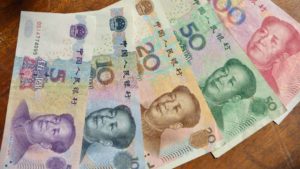While the US dollar is often seen as the standard international currency, the Chinese Yuan Renminbi has been enjoying a rise in popularity with the international community. So much so, that there are discussions about its use in the Caribbean and Guyana.

In a recent interview with Guyana Times International, Chinese Ambassador to Guyana Cui Jianchun hailed the move as a proactive one, which would likely lead to more Chinese investors coming to Guyana to invest as it would ease doing business.
Ambassador Jianchun noted that the process for using the Chinese dollar on an international scale had started in 2006. The discussions now being engaged in with the Caribbean Development Bank (CDB), he said, centred on ways China can play a more meaningful role in development.
“We have signed agreements with several countries,” the diplomat said. “There are three functions of the currency. One is about the foreign exchange reserves. And the second (benefit) is for investment in other countries. And the third is about a focus on trade.”
“Now, China has done a lot internationally. The CDB had a discussion about how China and the Caribbean countries can work together, with a focus on trade and investment. With regards to Guyana, at present time this (discussion) is done by the trading block,” he told this publication during an interview.
According to the Ambassador, Latin America is a model that anyone can refer to, when it came to the foreign usage of Chinese dollars.
“In Latin America, China has signed agreements with Argentina. That is the central bank would swap the currency. And also China has signed with Russia, Japan and South Korea, in the Asia and Pacific regions.”
The ambassador added that the Chinese Central Bank provides “Chinese currency and the other side provide their country’s currency. It is helpful to facilitate trade and investment.”
Explaining the process, Ambassador Jianchun related that it works by one country’s central bank making an agreement with the Chinese Central Bank. The Chinese Central Bank would then be able to travel to Guyana and use the currency.
“Otherwise you cannot use the Chinese currency,” Jianchun said. “The first step is that the Chinese Central Bank will talk and negotiate with the central bank of the respective countries.”
“For example, China does not use the US dollar or the pound. They can use their own currency. It would be very convenient for the business people to invest in Guyana.”
He noted that while the US dollar is seen as the standard international dollar, the use of the Chinese renminbi is on the rise by banks, people and business in general.
This comes against the backdrop of Guyana potentially joining other Caribbean countries that use the Chinese currency Yuan renminbi, within its economy, once consultations have been completed and approval given.
This was revealed by Minister of State Joseph Harmon, during a post-Cabinet press briefing on Thursday.
He related that Finance Minister Winston Jordan recently attended a conference in Barbados, where Caribbean countries gathered to explore the possibility of the Chinese currency being used within the Caribbean.
During the conference it was determined that bilateral ties between countries with a large presence of Chinese nationals and China would be easily facilitated by the use of the Yuan Renminbi.
Speaking at the conference, Caribbean Development Bank President William Warren Smith had said that the Chinese Renminbi may be able to protect the Caribbean region’s access to global finance services.
He noted that this comes at a time when many international financial instructions are withdrawing their services from the region.
The Chinese Renminbi is enjoying a rapid internationalisation of the Renminbi, starting in 2006 with the floating of the exchange rate.”
One of the Region’s leading economists told WIC News that working with China has its benefits but that the Region “must not oversell itself to the powerhouse” and lose any independence.
As an International Monetary reserve currency, the Renminbi is now in the IMF’s special drawing rights basket, which determines currencies that countries can receive as part of IMF loans.
The other currencies in the basket are the US dollar, the Euro, Yen and the British pound.



